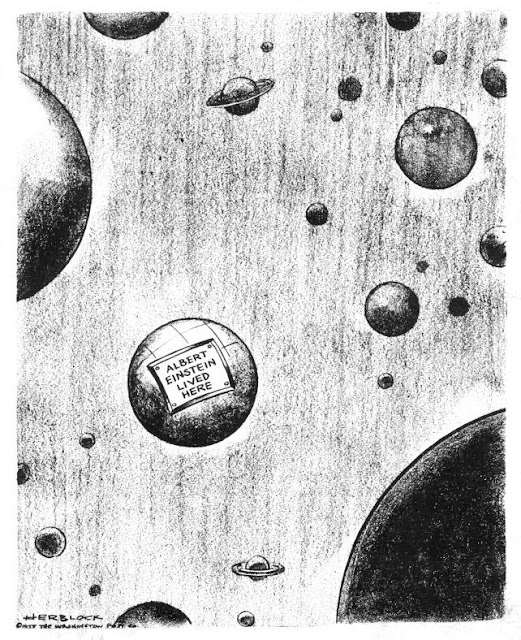Who on earth was Einstein and why are we still celebrating his relativity-thing?
Knowledge is sweet,
said PhD Hanoch Gutfreund to a full auditorium during the XXXI Guadalajara
International Book Fair. He shared the story of a rabbi who during the
World War II used to teach his students the alphabet by writing the letters
with honey on a chalkboard in his basement, where they would hide to have the
classes; the kids were meant to lick these letters made of honey, to eat them
in order to learn them. So, the rabbi was teaching his pupils not just the
alphabet but also to appreciate the knowledge and to realize the sweetness of
acquiring it, he was aiding to feed them during such tragic times too.
With this in
mind, the sweetness of knowledge, Hanoch asked his audience what was humanity
celebrating by commemorating in 2015 the General Theory of Relativity's fist
century. He encouraged us to wonder why relativity seemed to have such an
important role in the gravitational waves discovery (or vice versa), why the celebration
started two years ago kept going in 2017, why Albert Einstein and relativity
were still on the agenda with workshops, television programmes, theatre plays,
conferences, etcetera.
Perhaps, if we want
to fully understand the legacy left by Einstein to humanity, we should start by
having a look at his life. In this sense, the lecturer shared his joy of having
access to the Hebrew University of Jerusalem's Albert Einstein Archives: a unique
cultural treasure that consists of over eight thousand documents (pictures,
correspondence, articles…). Through the study of his own words, we can picture a
scientist who was not just interested in science but also in issues such as nationality
and nationalism, war and peace, human liberty and dignity, god and religion.
Einstein was
indeed a science philosopher and epistemologist, he was concerned about how to do science. He was convinced that
the science aim was achieving comprehension of the laws that govern nature, he
stated to be driven by his need to generalize. And then there he was, aged 26
in 1905, the Miraculous Year, when he published five articles that would make
essential and transcendent changes in physics fields. And do you know what? He
made it all "during his free time". By then, he was not working at a
university (as he would have desired), he had a full-time job at a patent
office, he had a new-born on his lap, and yet, in a year, "he solved what classical
physicists would not".
In these five miraculous papers, Einstein, among other
revolutionary theories of modern physics, proved the reality of atoms (their
existence), introduced the quantum nature of light (by doing it, started what
later became quantum mechanics) and gave the world the most famous equation so
far: E=mc2 (part of the Theory of Special Relativity), which allows
us to understand what happens in the Sun and also gave birth to the atomic bomb.
The General Theory of Relativity would come 10 years later, in 1915,
introducing gravity into the equation; following a general principle of
science: unite and generalize.
Gravity used to
be described as a force that gives everything the same acceleration, that was the
cornerstone Isaac Newton built about gravity. In 1907 Einstein had what he
called "the happiest thought of my life": the equivalence principle,
which tells us acceleration equals gravitation. To one of the most brilliant minds
of all times, it took about eight years to finally formulate such conceptual
revolution. So: gravitation in not a force, it is actually a property of
space-time; space-time is not a static arena on which physical events occur, it
is a dynamic entity that is part of physical events (matter curves space-time,
massive bodies and light move in a curved space-time).
Yeah, right:
equations, theories, revolutionary ideas... But why are we celebrating, really?
Well, for example, thanks to Einstein (either directly or based on his
contributions), we now know for sure sunlight beams are curved due to Sun's gravitational
force, through atomic clocks we have already measured the relativity of time,
we were able to develop the global positioning system technology, we have a
better understanding of the Universe (Big Bang, black holes, gravitational
waves…) in modern cosmology. The 1921Nobel Prize in Physics dedicated his last
25 years of life in the quest for a unified field theory, but he did not
succeeded. His last days were spent on a world disarmament manifesto, a speech on
Israel independence and 11 pages of equations.
Hence, we must
be proud, honoured and pleased by the fact of being able to say that Albert
Einstein lived on this planet; that we, humans, belong to the same species as
the one who perceived, named and explained the relativity-thing of the Universe,
and without even leaving this tiny blue dot in the space we live in, with
nothing more than hard work, conviction, an open scientific awareness and imagination. Hanoch Gutfreund ended his participation by showing us the famous cartoon Herb Block published the day Einstein died.

Comentarios
Publicar un comentario